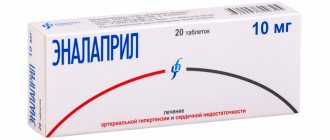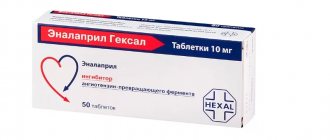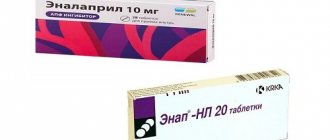Renipril®
Caution must be exercised when prescribing Renipril® to patients with reduced circulating blood volume (as a result of diuretic therapy, limiting salt intake, hemodialysis, diarrhea and vomiting) - the risk of a sudden and pronounced decrease in blood pressure is increased after using even the initial dose of an ACE inhibitor. Transient arterial hypotension is not a contraindication for continuing treatment with the drug after stabilization of blood pressure. In case of a repeated pronounced decrease in blood pressure, the dose should be reduced or the drug discontinued.
The use of high-permeability dialysis membranes increases the risk of developing an anaphylactic reaction. Correction of the dosage regimen on days free from dialysis should be carried out depending on the level of blood pressure.
Before and during treatment with ACE inhibitors, periodic monitoring of blood pressure, blood parameters (concentration of hemoglobin, potassium, creatinine, urea, liver enzyme activity), and protein in the urine is necessary.
Patients with severe heart failure, coronary heart disease and cerebrovascular disease, in whom a sharp decrease in blood pressure can lead to myocardial infarction, stroke or impaired renal function, should be carefully monitored.
Sudden cessation of treatment does not lead to withdrawal syndrome (a sharp rise in blood pressure).
For newborns and infants who have been exposed in utero to ACE inhibitors, it is recommended to conduct careful monitoring for timely detection of a pronounced decrease in blood pressure, oliguria, hyperkalemia and neurological disorders that may be due to a decrease in renal and cerebral blood flow with a decrease in blood pressure caused by ACE inhibitors. In oliguria, it is necessary to maintain blood pressure and renal perfusion by administering appropriate fluids and vasoconstrictors.
Before studying the functions of the parathyroid glands, the drug should be discontinued. Alcohol enhances the hypotensive effect of the drug.
Before surgery (including dentistry), the surgeon/anesthesiologist must be warned about the use of ACE inhibitors.
In the presence of renal failure, the excretion of the active metabolite may be reduced, leading to an increase in its concentration in the blood plasma. Such patients may need to be prescribed smaller doses of the drug.
In patients with arterial hypertension and unilateral or bilateral renal artery stenosis, an increase in urea and creatinine in the blood serum is possible.
In such patients, renal function should be monitored during the first few weeks of therapy. It may be necessary to reduce the dosage of the drug.
The balance of risk and potential benefit should be taken into account when prescribing Renipril® to patients with coronary and cerebrovascular insufficiency due to the risk of increased ischemia with excessive arterial hypotension.
The drug should be prescribed with caution to patients with diabetes mellitus due to the risk of developing hyperkalemia.
Patients with a history of angioedema may have an increased risk of developing angioedema during treatment with Renipril.
Patients with significant autoimmune diseases, such as systemic lupus erythematosus or scleroderma, are at increased risk of developing neutropenia or agranulocytosis while taking Renipril®.
Caution is recommended when prescribing Renipril® for the treatment of chronic heart failure in patients receiving cardiac glycosides and/or diuretics.
Renipril tablets 10 mg No. 20**
To register and make a purchase at Apteka17 LLC, you need to provide the site with some personal data that is necessary to place an order for the purchase of goods or the provision of services. By accepting the terms, you:
- provide reliable information about yourself (user name, email address (e-mail), contact phone number, place of residence, passport details (when registering a return of goods) and bank card information)
- give your consent to its collection and processing by Apteka17 LLC for the purpose of providing you with its goods and services (products), including, but not limited to: delivery, provision of services, distribution of advertising messages (including about ongoing promotions and special offers through any communication channels, including by mail, SMS, e-mail, telephone, other means of communication), collecting opinions on the work of Apteka17 LLC
- By placing an order on the Website, the Client, in accordance with Part 1 of Article 18 of the Federal Law “On Advertising”, provides his prior consent to receive advertising messages (in the form of SMS and/or push notifications and/or through applications and/or instant messengers for smartphones and/or telephone calls and/or otherwise to the telephone number or email address specified by the Client). If you do not want to receive advertising messages, the Client should call the Pharmacy by phone or write an e-mail with a request to refuse advertising SMS.
During processing, we have the right to perform the following actions with personal data: collect, record, systematize, accumulate, store, clarify, extract, use, transfer in order to study customer needs and improve the quality of our products and services, depersonalize, block, delete , destroy.
LLC "Apteka17", registered at the address: 127521, Moscow, Oktyabrskaya str., 105, in accordance with the legislation of the Russian Federation, guarantees the non-disclosure of personal information transmitted by you, and also undertakes to ensure its safe storage - protection from accidental or intentional unauthorized access and prevention of possible risks of copying, distribution, blocking, modification, damage, loss or destruction of data.
You can pick up your order at any of the many pharmacies of our partners. Delivery of medicines can only be carried out for citizens belonging to preferential categories on the basis of Art. 2 of the Federal Law of the Russian Federation of 01/09/1997 N 5-FZ “On the provision of social guarantees to heroes of socialist labor and full holders of the Order of Labor Glory” (as amended on 07/02/2013) and Article 1.1 of the RF Law of 01/15/1993 N 4301-1 “ On the status of Heroes of the Soviet Union, Heroes of the Russian Federation and full holders of the Order of Glory"
Side effects
From the nervous system and sensory organs: dizziness, headache, weakness, increased fatigue, decreased libido.
From the cardiovascular system and blood (hematopoiesis, hemostasis): hypotension, collapse, neutropenia, hyperkalemia.
From the gastrointestinal tract: nausea, impaired liver function (increased activity of liver transaminases, bilirubin levels), diarrhea.
Other: cough, skin rashes, renal dysfunction, proteinuria, muscle spasms, angioedema.
Enalapril, 10 mg, tablets, 20 pcs.
There is no experience with the use of enalapril in patients who have recently undergone kidney transplantation. Therefore, the use of this drug in such patients is not recommended.
The use of Enalapril in patients with liver failure usually does not require dose adjustment. Rarely, taking an ACE inhibitor is associated with a syndrome ranging from the development of cholestatic jaundice to the development of fulminant liver necrosis. If symptoms of jaundice or increased activity of liver enzymes appear in patients taking ACE inhibitors, discontinue drug therapy and conduct an appropriate examination. In patients taking ACE inhibitors, cases of neutropaeia/agranulocytosis, thrombocygopenia and anemia have been reported. In patients with normal renal function and no other complications, neugropenia rarely develops. The drug Enalapril should be used with great caution in patients with connective tissue diseases (including systemic lupus erythematosus scleroderma) who are simultaneously receiving immunosuppressive therapy with allopurinol or procainamide, as well as a combination of these factors, especially with existing renal dysfunction. These patients may develop severe infections that do not respond to intensive antibiotic therapy. If patients still take the drug Enalapril, it is recommended to periodically monitor the number of leukocytes in the blood. The patient should be warned that if any signs of infection appear, they should consult a doctor.
Angioedema of the face, extremities of the tongue, vocal cords and/or larynx has been reported with the use of ACE inhibitors, including enalapril. This can happen at any time during treatment. In such cases, treatment with Enalapril should be stopped immediately and the patient should be under medical supervision until the corresponding symptoms completely disappear. Even in cases where only difficulty in swallowing occurs without difficulty breathing, patients may require long-term medical supervision because Therapy with antihistamines and glucocorticosteroids may not be enough. Angioedema associated with swelling of the larynx and tongue can be fatal in very rare cases. Patients with swelling of the vocal cords or larynx may develop airway obstruction, especially in patients with a history of respiratory surgery. In cases of airway obstruction, it is necessary to carry out appropriate therapy as soon as possible, including subcutaneous administration of epinephrine (03-05 ml of epinephrine (adrenaline) solution in a ratio of 1:1000) and/or take the necessary measures to ensure the conductivity of the airways (intubation or tracheostomy).
Among black patients receiving ACE inhibitor therapy, the incidence of angioedema is higher than among patients of other races. Patients with a history of angioedema not associated with the use of ACE inhibitors have an increased risk of developing angioedema when taking any ACE inhibitor.
There are reports of the development of life-threatening anaphylactic reactions in patients taking ACE inhibitors. during the desensitization procedure with hymenoptera venom. Such reactions can be avoided if you temporarily stop taking ACE inhibitors before desensitization begins. The use of ACE inhibitors should be avoided in patients receiving bee venom immunotherapy.
In rare cases, life-threatening anaphylactoid reactions have been observed in patients taking ACE inhibitors during LDL apheresis with dextrin sulfate. If LDL-afsrez inhibitors are used, AIF inhibitors should be temporarily replaced with other drugs for the treatment of arterial hypertension and heart failure.
Anaphylactoid reactions have been reported in patients undergoing hemodialysis using high-flux polyacrylonitrile membranes (AN69). In these cases, it is recommended to use a different type of membrane for dialysis or use an antihypertensive drug of a different pharmacotherapeutic group.
When using the drug Enalapril in patients with diabetes mellitus receiving hypoglycemic agents for oral administration or insulin during the first month of therapy, it is necessary to regularly monitor the concentration of glucose in the blood.
Cough has been reported with the use of ACE inhibitors. Usually the cough is non-productive and persistent and stops after discontinuation of ACE inhibitors. In the differential diagnosis of cough, cough caused by the use of ACE inhibitors must also be taken into account. In patients undergoing surgery or during general anesthesia with the use of drugs that cause arterial hypotension, ACE inhibitors may block the formation of angiotensin II in response to compensatory release of renin. Before surgery (including dental procedures), it is necessary to warn the surgeon-anesthesiologist about the use of Enalapril.


